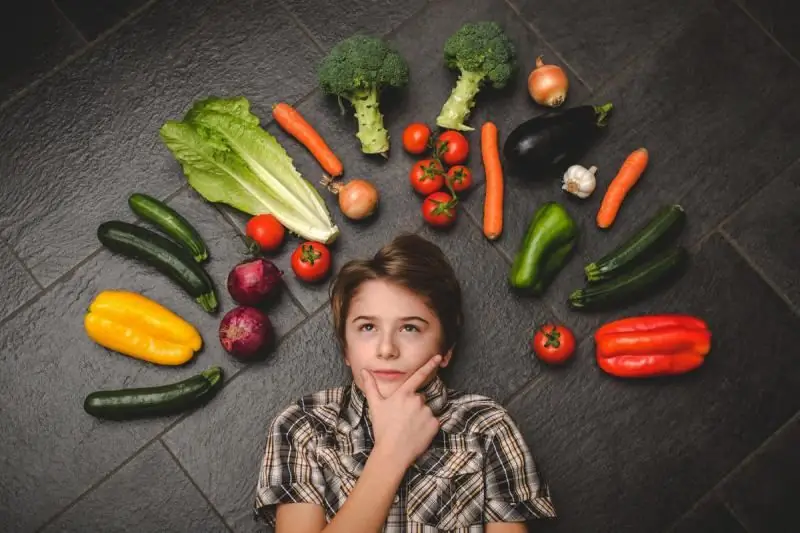
Table of contents:
- Author Bailey Albertson [email protected].
- Public 2024-01-17 22:26.
- Last modified 2025-06-01 07:32.
Vegetarianism: the benefits and dangers of avoiding meat

Vegetarianism is a diet that provides for the rejection of meat, as well as complete or partial exclusion of animal products from the diet. It is impossible to speak unequivocally about the benefits or dangers of a plant-based diet. To understand if a meat-free diet is right for you, be guided by more than ethical animal behavior. Consider the facts and arguments that point to the benefits and harms of vegetarianism.
Vegetarianism: types and features
It is possible that primitive gatherers ate only plants. There were not enough of them when the ice age came. Some scientists believe that it was then that people began to hunt and eat meat. In the process of evolution, digestion adapted to the processing of animal food (enzymes appeared to break down meat fibers, teeth became covered with enamel, the acidity of gastric juice increased, etc.). Man became omnivorous.
Vegetarianism involves a complete rejection of meat, fish and seafood, but livestock and beekeeping products are not always excluded

According to the conviction of many vegetarians, eggs, milk and honey can be consumed, since for their extraction there is no need to take the life of a living creature.
Veganism is a strict vegan diet, especially when it comes to raw food diets.

Vegans deny any food of animal origin and everything related to the exploitation and killing of animals (leather and fur products, performances of animals in the circus, hunting, fishing, testing cosmetics, etc.)
Pros and cons of eating purely plant foods
A vegetarian diet has many benefits:
- Cheerfulness and lightness. Vegetarians leave the table with a slight feeling of hunger. In addition, plant foods are easily digested, which gives a person the opportunity to be in good shape.
- Fruits, vegetables, cereals are rich in minerals and vitamins.
- Vegetarians do not suffer from fiber deficiency, so they rarely have constipation.
- Those who avoid animal food, the risk of obesity, diabetes, vascular hardening is minimized.
But it's worth mentioning the disadvantages:
- Plants have no vitamin B12. Its absence in the body leads to anemia.
-
Vegans are deprived of animal cholesterol, which in small quantities is necessary for blood vessels and liver function.

milk and eggs Including milk and eggs in food, you can get not only the protein necessary for the body, but also the minimum amount of animal cholesterol involved in metabolism
-
The bioavailability of animal protein for humans is higher than that of plant protein. Legumes are considered a treasure trove of vegetable protein, but even from them it is impossible to obtain all amino acids.

protein content in different foods Despite the fact that in some plants the percentage of protein content is higher than in meat products, the amino acids of the latter are absorbed more efficiently
Some claims about the benefits of vegetarianism are inconclusive:
- Eating a plant-based diet is cost effective. In warm countries this is true, but in the northern latitudes, fruits and vegetables are expensive.
- Plant food is environmentally friendly, and meat is rich in hormones and antibiotics. Today, fields and gardens are treated with pesticides. Imported vegetables and fruits are coated with special compounds so that they safely fall on store shelves. The statement is true when everything is grown independently.
- Vegetarians are more cheerful, calmer and kinder than meat eaters. Firstly, among the first and second there are people of different temperaments and temperaments. Secondly, vegetarians can be aggressive. Confirmation of this is the obsessive propaganda of refusing meat and the expression of protest not always in a peaceful way.
- Vegetarians are healthy people. Eating without meat can save some ailments, but it makes the body prone to other diseases.
Photo gallery: common diseases in vegetarians
-

normal bone and osteoporosis -
Vegetarians have poor absorption of calcium, so they are prone to osteoporosis and brittle bones
-

liver and gallbladder - The absence of animal cholesterol in the diet leads to the formation of stones in the gallbladder
-

brittle nails and weak hair - For vegans, hair becomes dry and dull over time, and nails become brittle.
-

dental examination - Vegans need to take extra care of their teeth, since the enamel deteriorates from large quantities of fruit acids and constant chewing of raw vegetables.
-

bowel cancer - Lack of meat in the diet reduces the risk of pancreatic cancer, but increases the likelihood of colon cancer
-

girl with a cold - After a few years of veganism, immunity decreases, since protein is needed to form protective immunoglobulins
Features for men, women, children and seniors
When talking about the benefits of vegetarianism, you need to take into account the age and gender of a person.
Protein requirements are higher in men than in women. Accordingly, it is more difficult for them to exclude livestock products. In addition, plants contain phytoestrogens, the excess of which is undesirable for the male reproductive system.

A small amount of phytoestrogens in the male body provides the prevention of prostate cancer, the excess leads to a decrease in reproductive function
Phytoestrogens are shown to women, especially in postmenopausal women. The female body is easier and faster to adapt to vegetarianism. It is better to postpone the latter if you plan to conceive and carry a child.

The lack of complete protein and vitamin B12 in the diet of a pregnant woman can lead to serious complications such as eclampsia, fetal hypoxia, miscarriage
Vegetarianism is not shown to children. The growth and maturation of the body requires a regular supply of essential amino acids. Children who do not receive dairy products and fish are prone to rickets and brittle bones (due to a deficiency of vitamin D, which is needed for calcium to be absorbed). Lack of vitamins B and omega-3 negatively affects the development of the nervous system. High risk of stunted growth and development in vegan children.

The child does not make an independent choice in favor of vegetarianism, but it is he who risks his health in the name of other people's beliefs
Vegetarianism is most useful for people over 50-55 years old, since the body no longer grows, and hormonal activity is reduced. Plant proteins are enough to maintain metabolism, while reducing cholesterol levels. But in older people there is a need for proteoglycans, which are necessary to maintain elasticity of the skin, tendons, and strengthen joints.

Proteoglycans (chondroitin, glucosamine) are complex proteins contained in meat and bone broths, but you can make up for their lack in the body by taking drugs from the group of chondroprotectors
How to balance a vegetarian diet
Vegetarian food can be brought closer to complete, but it cannot be said that it will provide the body with all the nutrients. Lacto and ovo vegetarians obtain bioavailable protein and other essential nutrients from dairy products and eggs. Vegans for some time may not complain about the deficiency of any substances, while the body compensates for the lack of those with its own reserves. But over time, it becomes necessary to supplement the diet with eggs, milk or protein supplements.

Protein supplements are available not only at vegetarian stores, but also at sports nutrition outlets and some supermarkets.
Protein in the form of a supplement isolated from plants can support the health of the vegetarian due to its high bioavailability.
Vegetarianism is a concept in which avoiding meat plays a major role. The question of the usefulness of such nutrition remains open, since there is no indisputable evidence of its benefits or harm. Both meat eaters and vegetarians get sick. The specificity of pathologies depends both on nutrition and on the surrounding climate, ecology, heredity, lifestyle, etc. Doctors and nutritionists recommend a diet with a predominance of plant and animal food for the average person.
Recommended:
Do-it-yourself Bath From Blocks - Expanded Clay Concrete, Gas Silicate And Others - The Pros And Cons Of The Material, Step-by-step Instructions With Photos, Videos And Project Dra

How to build a bath from expanded clay concrete blocks. The choice of materials and construction of the bath. Step-by-step instructions for the installation and decoration of a concrete block bath
Door Handles: Varieties And Characteristics, Pros And Cons, And How To Install Correctly

Purpose and design of door handles. Types of door handles, their pros and cons. Features of installation and repair of different types of door handles
Platbands On The Door: Varieties With A Description And Characteristics, Pros And Cons, And How To Install Correctly

Why do we need door trims and how they can be beaten in the interior. How to do it yourself from wood, plywood and plaster. We study materials and make a choice
Celery: Health Benefits And Harms For Men, Women And Children, Recipes

Types of celery. Chemical composition of root and stalk celery. Benefits and contraindications. How to eat. Juice and salad recipes. Limitations
Coconut Milk: Benefits And Harms For Women, Men And Children

How is coconut milk different from coconut water? The benefits and harms of coconut milk, features of its chemical composition and use
